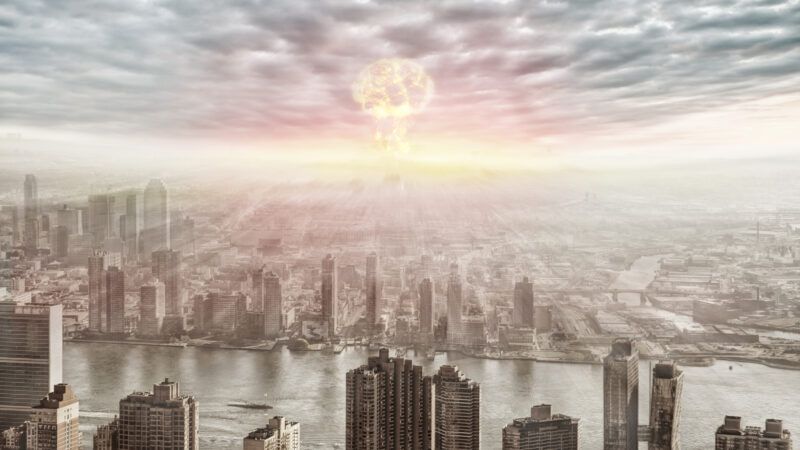FEMA Encourages Survivors of a Nuclear Holocaust To Mask, Socially Distance
The COVID-conscious advice from the federal government's primary disaster response agency is silly. It's also outdated.

While the potential for Russia's invasion of Ukraine to spark a world-ending nuclear conflagration has knocked the pandemic off most frontpages, federal bureaucrats seem determined to prove that they can focus on two crises at once.
On Sunday, Based Politics' Brad Polumbo reported that the Federal Emergency Management's (FEMA) ready.gov webpage for nuclear explosions encourages for people to mask and socially distance should they be hunkering in a bunker with members outside of their own households.
Should one hear a warning of an imminent nuclear attack, FEMA's website encourages people to shelter inside the nearest building, preferably one made of brick or concrete, and as far away from windows as possible.
"When you have reached a safe place, try to maintain a distance of at least six feet between yourself and people who are not part of your household," continues the agency's webpage. "If possible, wear a mask if you're sheltering with people who are not a part of your household."
Ready.gov says people should stay inside for at least 24 hours after the bombs hit, during which time they should continue to socially distance and mask.
FEMA also has some helpful advice for those who survive the nuclear holocaust. Someone having a medical emergency is encouraged to contact 911. Provided the operator also survived, you are to tell them if you think you have COVID-19 and make sure to mask up before help arrives.
It's said that following a nuclear war, the survivors might end up envying the dead.
Fortunately, FEMA offers some helpful advice for those suffering psychic discomfort at witnessing the world set on fire. They're sensitive to the fact that survivors might have already had a lot on their plate before the bombs dropped.
"Talk to someone if you are feeling upset. Many people may already feel fear and anxiety about the coronavirus 2019 (COVID-19). The threat of a nuclear explosion can add additional stress," ready.gov notes.
It encourages people to engage virtually with their community through video and phone calls. (No guidance is provided on whether it's okay to meet outside in a socially distanced fashion if all telecommunications have been disabled.)
FEMA's covid-conscious advice is getting a lot of mockery from the conservative corners of the internet, and deservedly so.
Throughout the pandemic, the public health bureaucracy has generally done a poor job of balancing the tradeoffs between combating COVID and addressing other pressing issues of health and human well-being. They've also often demonstrated a remarkedly limited understanding of how people will actually respond to their advice in emergency situations.
The federal government's chiding about social distancing in fallout bunkers takes this obtuseness about human nature to the extreme. It's like trying to enforce capacity restrictions at the fiddle concert while Rome burns.
That this advice is coming from FEMA adds more irony still. One of the agency's core responsibilities during disasters is to help coordinate the communication and response efforts of multiple government agencies.
But the agency has clearly failed to coordinate with other agencies when advising people of what to do in the event of a nuclear explosion.
As of Friday, the Centers for Disease Control and Prevention is no longer recommending that people socially distance or wear masks indoors if they live in the 70 percent of the country rated at low or medium risk of COVID-19. That advice would seemingly apply to fallout shelters as well.
So provided you don't live in a high-risk county, you should feel free to be unmasked while you and members of another household negotiate how many shotgun shells they'd be willing to trade for a few cans of irradiated tuna.
